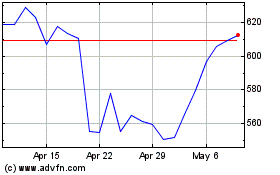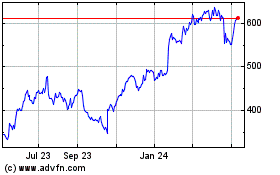What Is Alternative Data? -- Journal Report
December 08 2019 - 10:29PM
Dow Jones News
By Simon Constable
The term "alternative facts" has been roundly ridiculed since
its introduction into political discourse in 2017. There is,
however, a similar phrase used in finance that investors should
take seriously and understand: "alternative data."
Alternative data in finance refers to proxy metrics or
information originating from unofficial or noncompany sources that
individuals can use to gain insight into an investment. Such
information can be the difference between making a profitable and
unprofitable bet.
When measuring something as nebulous as investor anxiety, for
example you need a proxy because if you survey individuals directly
about anxiety "you may get a fuzzy answer," says David Ranson,
research director at financial analytics company HCWE & Co.
Mr. Ranson instead looks at credit spreads, such as the ICE
BofAML US Corporate BBB Option-Adjusted Spread, which measures how
much more creditworthy companies must pay compared with the
government to borrow money. That is, it measures the extra interest
that investors require before they will lend money to
companies.
When investors are anxious, the credit spread is wider. When
they are less worried, it is narrower. Recently, the BBB spread was
1.54 percentage points, according to data from the St. Louis Fed,
down from 2.06 percentage points on Jan. 3. That indicates that
investors are far less worried now than they were at the beginning
of the year. We know this because collectively, investors are
willing to accept lower interest payments when they lend money.
"You aren't measuring the exact thing, but a symptom of it," Mr.
Ranson says.
Some valuable metrics come from unofficial sources. That could
include consumer activity on the web. For instance, research
company IHS Markit regularly publishes alternative data, including
the various purchasing-managers indexes, or PMIs. A PMI is a
so-called diffusion index, which means that it registers whether a
sector is growing or shrinking.
The advantage for investors is that they typically can get
access to alternative data sooner than official figures.
Similarly, some companies collect information that investors can
use to get a reading on the health of a public company before that
firm reports results.
Eagle Alpha of Dublin collects data on consumer transactions,
social-media activity and online searches that investors could use,
say, to get a read on how much a streaming service's subscription
base has grown or fallen. "Using that gets you inside the boardroom
of the company," says Eagle Alpha founder and chief executive
Emmett Kilduff. "You can't just rely solely on the data sets, but
it is definitely a significant advantage."
Mr. Constable is a writer in Edinburgh, Scotland. He can be
reached at reports@wsj.com.
(END) Dow Jones Newswires
December 08, 2019 22:14 ET (03:14 GMT)
Copyright (c) 2019 Dow Jones & Company, Inc.
Netflix (NASDAQ:NFLX)
Historical Stock Chart
From Mar 2024 to Apr 2024

Netflix (NASDAQ:NFLX)
Historical Stock Chart
From Apr 2023 to Apr 2024
